Release Time:2024-09-24Update time:2024-09-24Reading times:894
Building Smart City in a Changing World & Release of
2024 League of Arab States (LAS) Smart City Ranking successfully held as a Thematic Forum of CIFTIS
A thematic forum themed “Building Smart City in a Changing World”, as part of the 2024 China International Fair for Trade in Services (CIFTIS), was held at China National Convention Center in Beijing on September 16, 2024, at which the 2024 League of Arab States (LAS) Smart City Ranking was released. The forum was co-hosted by the Institute for Global Cooperation and Understanding (iGCU) at Peking University and the Institute for Urban Internationalization Studies at Zhejiang International Studies University, under the support of Harbor Overseas, the Center for Science & Technology Development and Governance of Tsinghua University, and the Shenzhen Finance Institute. More than 100 government officials, experts, media representatives and other distinguished guests from 30 countries, regions and international organizations attended the event. Foreign guests accounted for approximately 60% of all attendees, indicating the forum’s global influence and demonstrating the participants’ high professionalism.
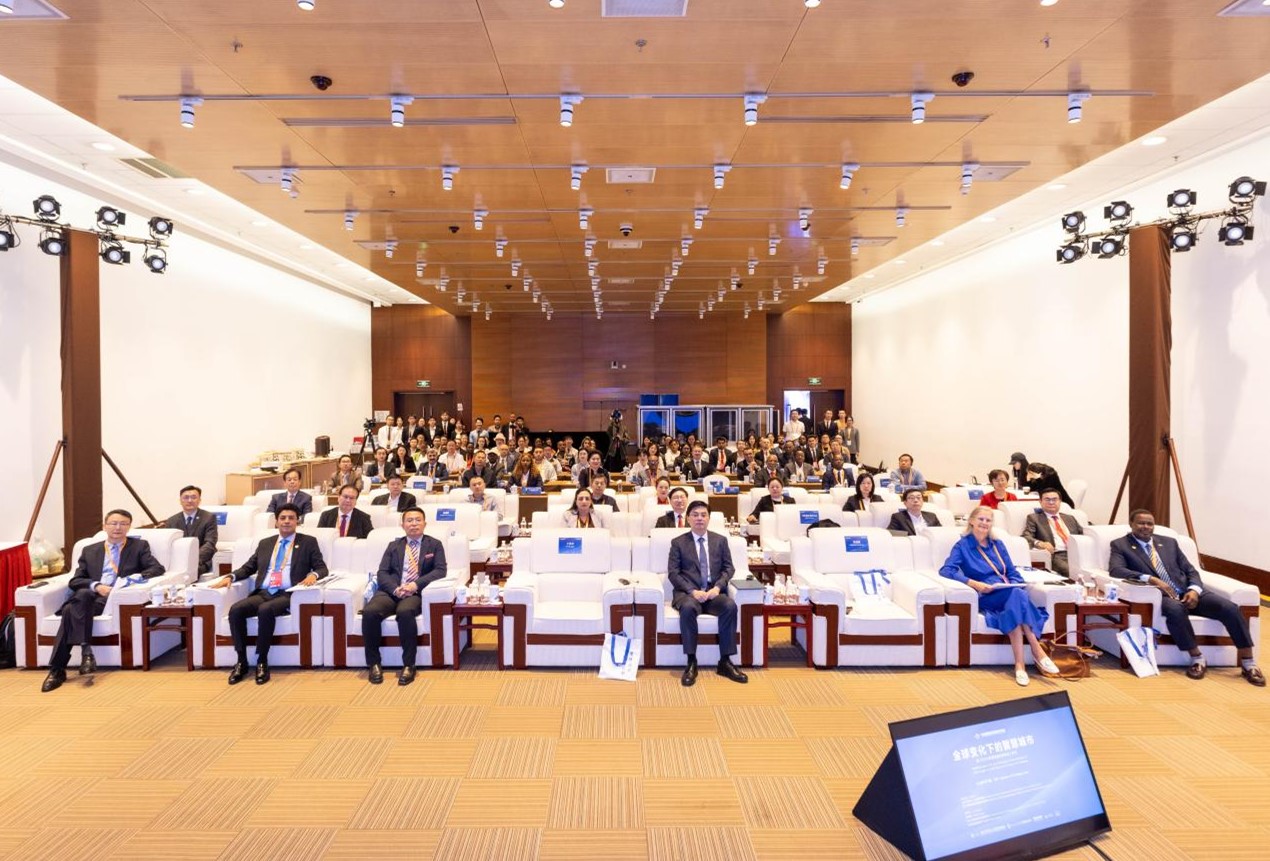
The opening ceremony of the forum was chaired by Prof. Dong Wang, Professor at School of International Studies at Peking University and Executive Director of the Institute for Global Cooperation and Understanding at Peking University.
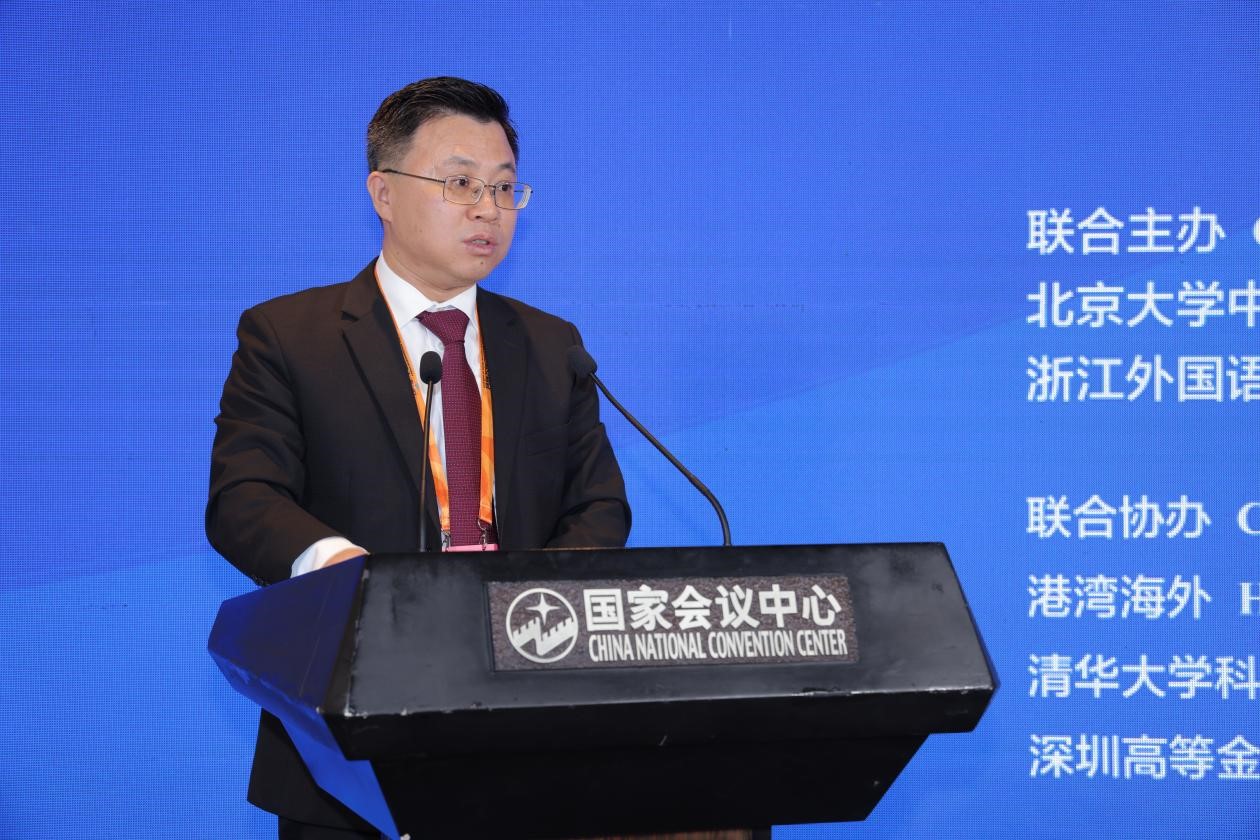
Prof. Dong Wang chairs the opening ceremony.
Prof. Fang Fang, Vice President of Peking University, delivered opening remarks at the opening ceremony. He noted that China is actively promoting high-standard opening up and innovating the development mechanism for trade in services. In recent years, Peking University has continuously advanced the intelligent development, reform and upgrading of higher education. Innovation is an invaluable spirit for academic research and the quintessence of learning style at Peking University, which has launched a number of innovative research projects focusing on key theoretical and practical issues. This thematic forum, co-hosted by the Institute for Global Cooperation and Understanding at Peking University and the Institute for Urban Internationalization Studies at Zhejiang International Studies University, represented an important effort made by Peking University and Zhejiang Province to jointly build Zhejiang International Studies University. Prof. Fang noted that the 2024 LAS Smart City Ranking would be released at the forum and expressed his hope that participants would conduct in-depth discussions and share their insightful views at the event.
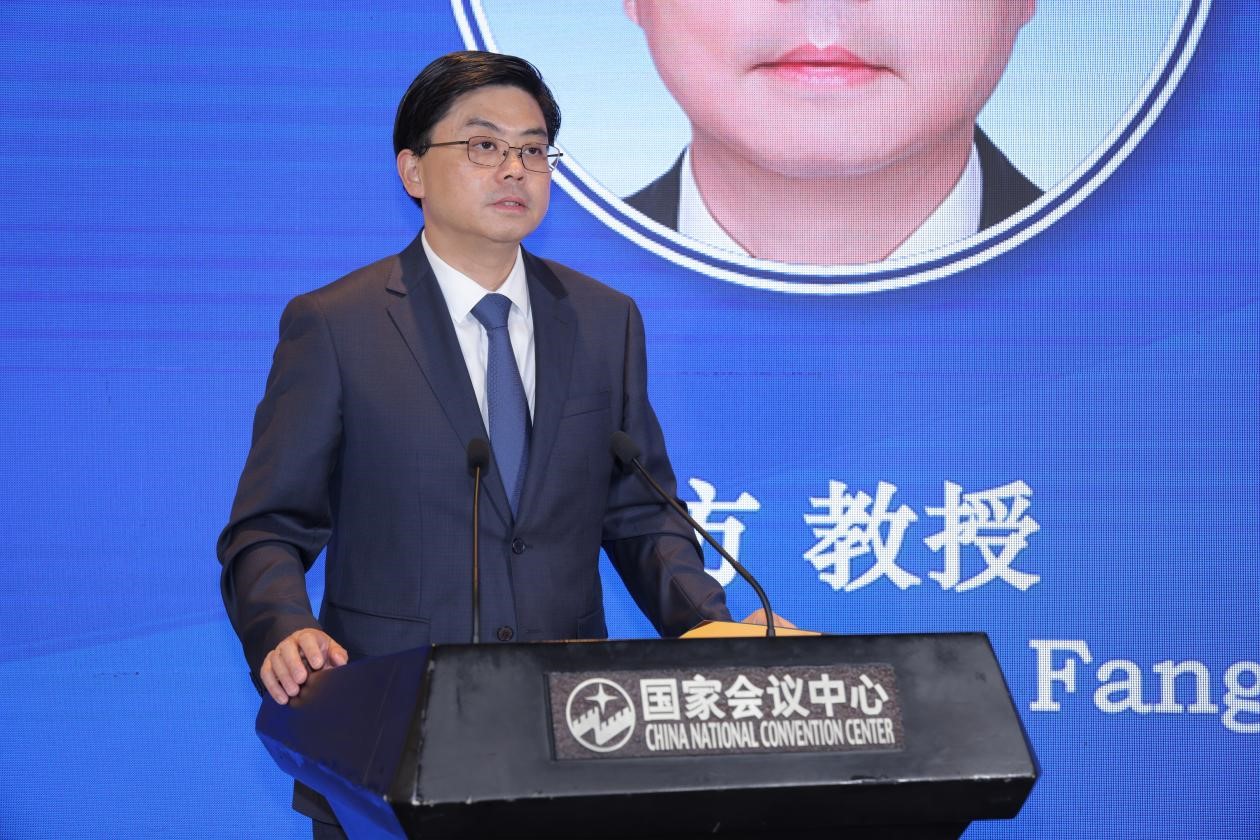
Prof. Fang Fang delivers opening remarks.
Prof. Zhenhua Mao, Vice President of Zhejiang International Studies University, also delivered opening remarks at the forum. He pointed out that amid the tide of globalization, innovation is the biggest opportunity and cooperation is the greatest challenge. The forum focused on discussing topics such as smart cities, international relations, international finance, and global governance oriented towards regional integration, which cover multilayered, multiregional and multidimensional challenges at the macro, meso and micro levels. The objective of the event was to provide solutions to effectively promoting regional integration from a global perspective. As a proverb goes, “If you want to go fast, walk alone; and if you want to go far, walk together.” In today’s world, more and more people have chosen to work together to seek innovation. The 2024 LAS Smart City Ranking released at the event provides reference for the planning, construction and operation of smart cities in the LAS region, and helps promote cooperation and exchanges across the entire region.
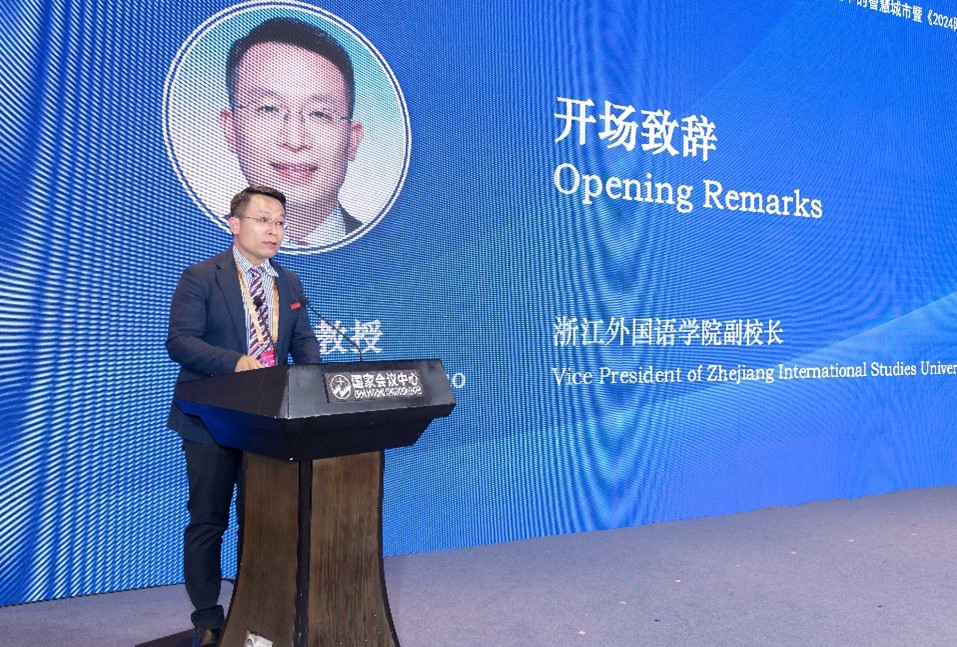
Prof. Zhenhua Mao delivers opening remarks.
Mr. Siddharth Chatterjee, United Nations (UN) Resident Coordinator in China, delivered a keynote speech at the forum. Urban areas play a vital role in addressing long-term challenges such as transportation, energy consumption, air pollution, green spaces, and unplanned expansion, thus providing key impetus for achieving the 2030 Agenda and the Sustainable Development Goals. In the face of these challenges, the concept of smart cities emerged, which aims to leverage technology and innovation to empower urban areas with inclusiveness and resilience through promoting the efficient and sustainable use of resources, minimizing waste and maximizing benefits. China has made significant progress in this field, using advanced technologies such as big data and cloud computing to modernize urban governance. The UN actively supports the development of smart cities in China and works with all parties to promote ecological sustainability.
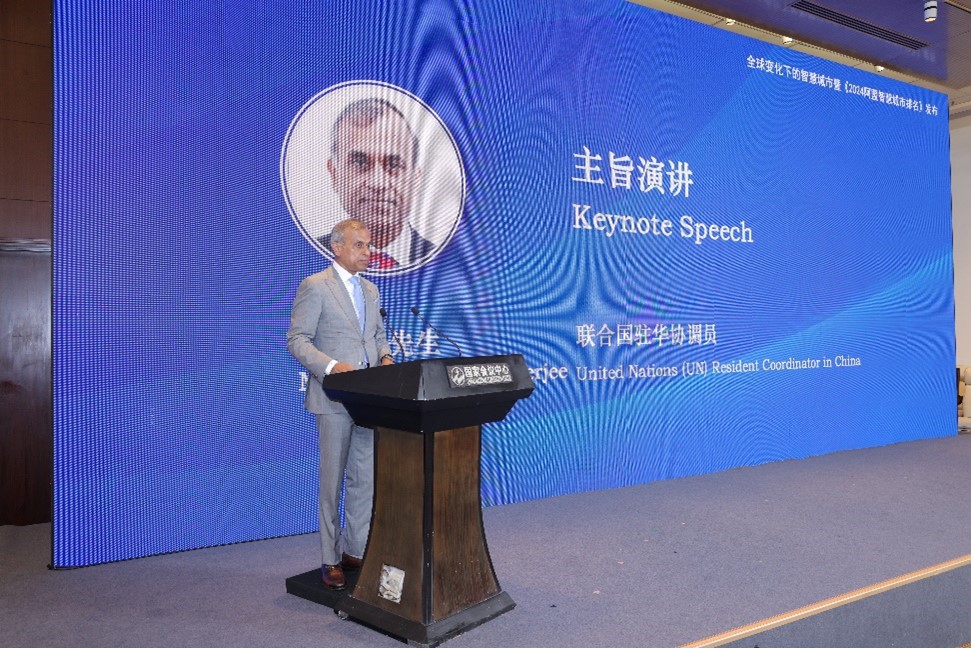
Mr. Siddharth Chatterjee delivers a keynote speech.
Mr. Hongjun Yu, former Vice Minister of the International Department of the CPC Central Committee and Vice President of the Chinese People’s Association for Peace and Disarmament, also delivered a keynote speech at the forum. He pointed out that political dialogue and cultural exchanges are two major engines to achieve common development and security and promote mutual learning among civilizations. As the world experiences profound changes, China needs to further deepen opening up and expand platforms for political interactions, so as to demonstrate the inclusivity, openness, creativity and growth potential of the comprehensive rejuvenation of the Chinese nation and the country’s modernization process. Meanwhile, cultural and people-to-people exchanges are essential to mutual learning among civilizations. It is necessary to give full play to universities, the media and other forces and fully mobilize all governmental and non-governmental positive factors to maximally achieve the integration between traditional and modern exchange and cooperation methods, accelerate cultural exchanges in a broad sense, and promote common progress and prosperity of human society.
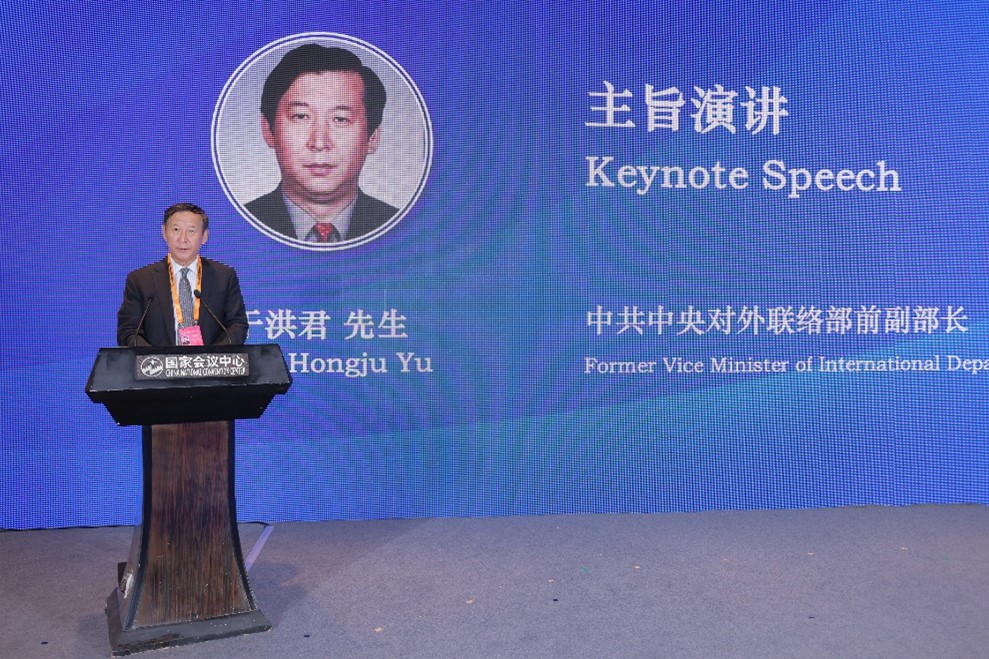
Mr. Hongjun Yu delivers a keynote speech.
Prof. Qingguo Jia, Professor of the School of International Studies at Peking University, Director of the Institute for Global Cooperation and Understanding at Peking University, Standing Committee Member of the Chinese People’s Political Consultative Conference (CPPCC) National Committee, delivered a keynote speech at the forum. He noted that the development of smart cities is currently facing security challenges at both the international and domestic levels, such as decoupling and chain-breaking, cyber attacks, extremist emotional catharsis, and the spread of disinformation. Therefore, the key to building smart cities is to resolve international and domestic contradictions, improve the transparency of internal and external policies, respond to public concerns in a timely manner, and balance security with other interests such as the economy and livelihood. He called for strengthening exchanges and cooperation to jointly address security risks and promote the healthy development of smart cities.
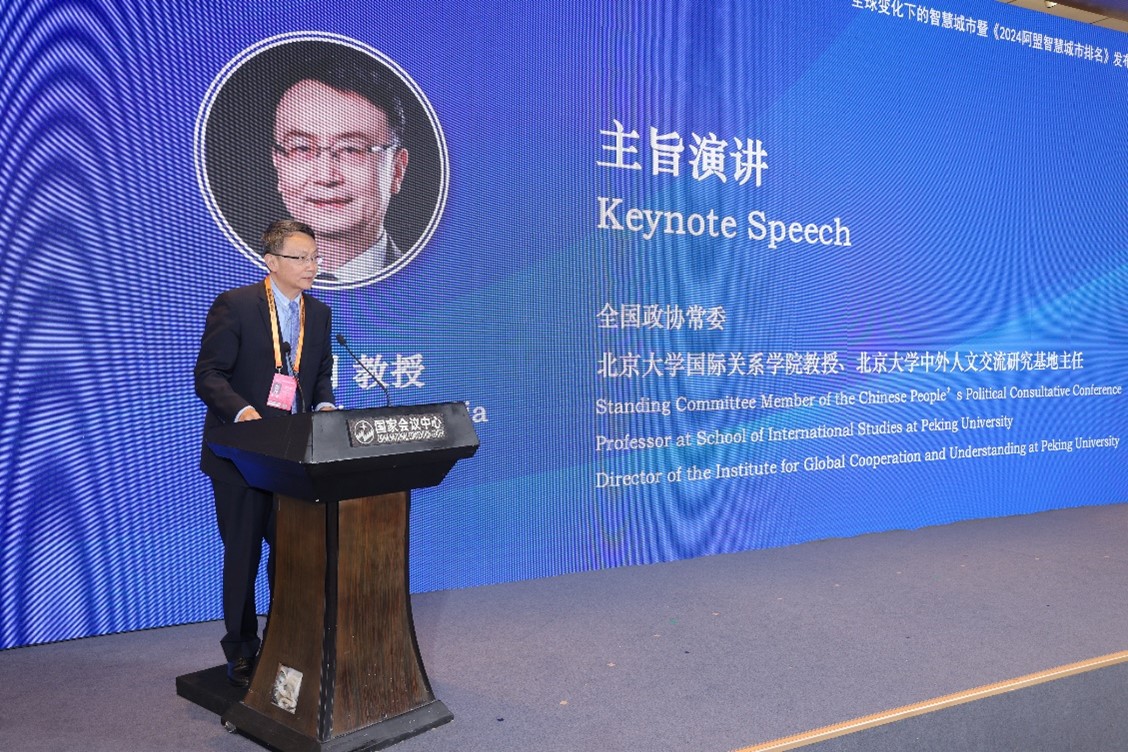
Prof. Qingguo Jia delivers a keynote speech.
The 2024 LAS Smart City Ranking is the core outcome of the thematic forum. The report was released at the event by Prof. Xi Chen, Distinguished Professor at Zhejiang International Studies University, Senior Visiting Fellow at United Arab Emirates University, and Founder of Harbor Overseas.
According to the report, Abu Dhabi, Dubai and Sharjah in the United Arab Emirates (UAE), Doha in Qatar, and Riyadh and Mecca in Saudi Arabia are among the top 10% cities on the ranking list in terms of the overall score. Among the second-tier cities (namely those ranking 10%-30% of all cities in terms of the overall score) on the ranking list, cities in the UAE, Qatar and Saudi Arabia, such as Al Ain, Al Rayyan, Dammam, Jeddah, Medina and Tabuk, performed well. At the same time, in North Africa, Egyptian cities such as Cairo, Suez and New Cairo, as well as Algiers in Algeria and Casablanca in Morocco, have also successfully made it to the second tier.
Prof. Xi Chen noted that unlike those in East Asia, Western Europe and North America, cities in LAS are mostly located in vast deserts. Except for the southern shore of the Persian Gulf with the potential to evolve into a world-class metropolitan cluster, the rise of the Nile Delta as well as the eastern coast of the Red Sea and the narrow strip of Morocco or Tunisia on the western coast of the Mediterranean is still taking time. The core challenge faced by those city clusters in their development process is the lack of meso-level planning in the integration of diverse infrastructure facilities – that is, fusing macro planning with micro projects vertically and connecting different countries and departments horizontally.
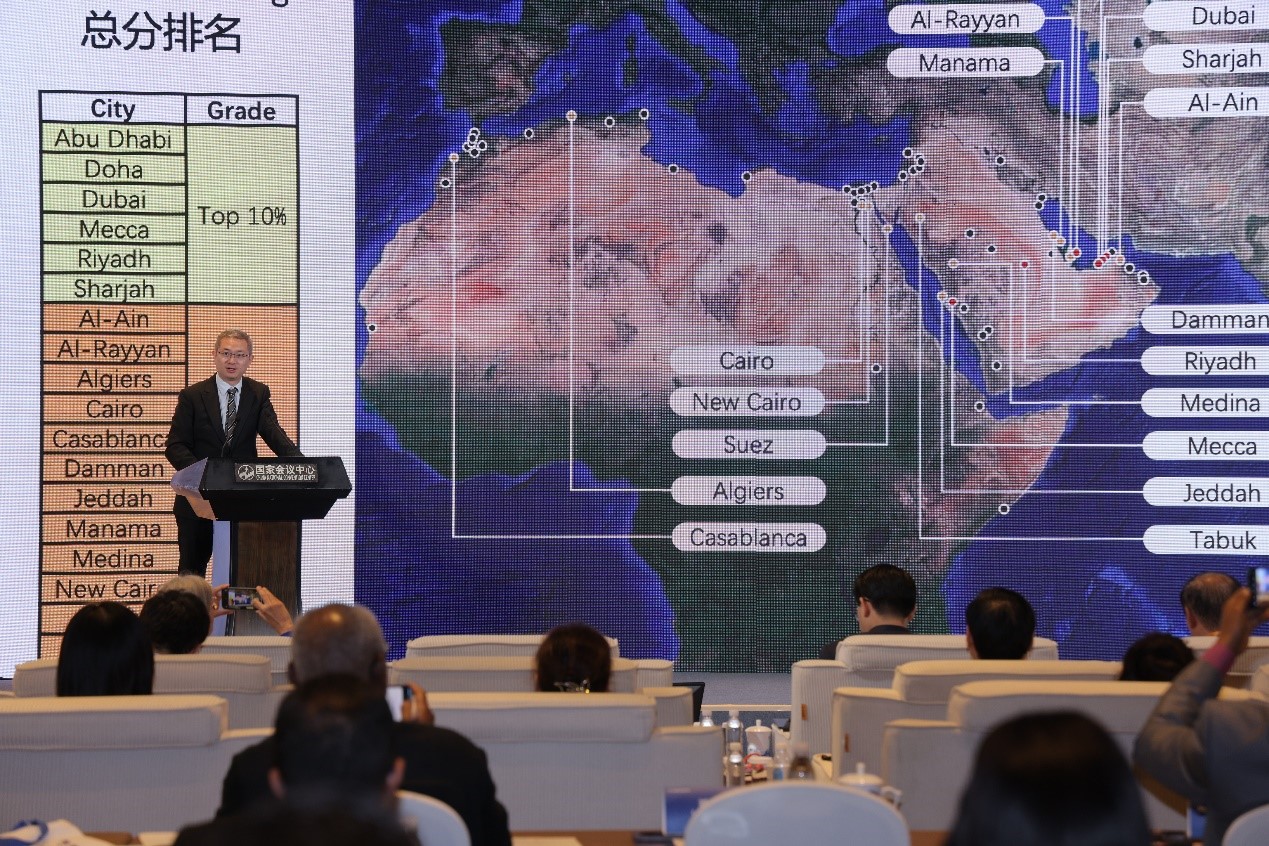
Prof. Xi Chen releases the report.
The forum consisted of three seminars with the themes of “Smart City and Regional Integration”, “International Relations and Regional Integration” and “Global Governance, International Finance and Regional Integration”, respectively. The topics discussed cover the core challenges to global sustainable development.
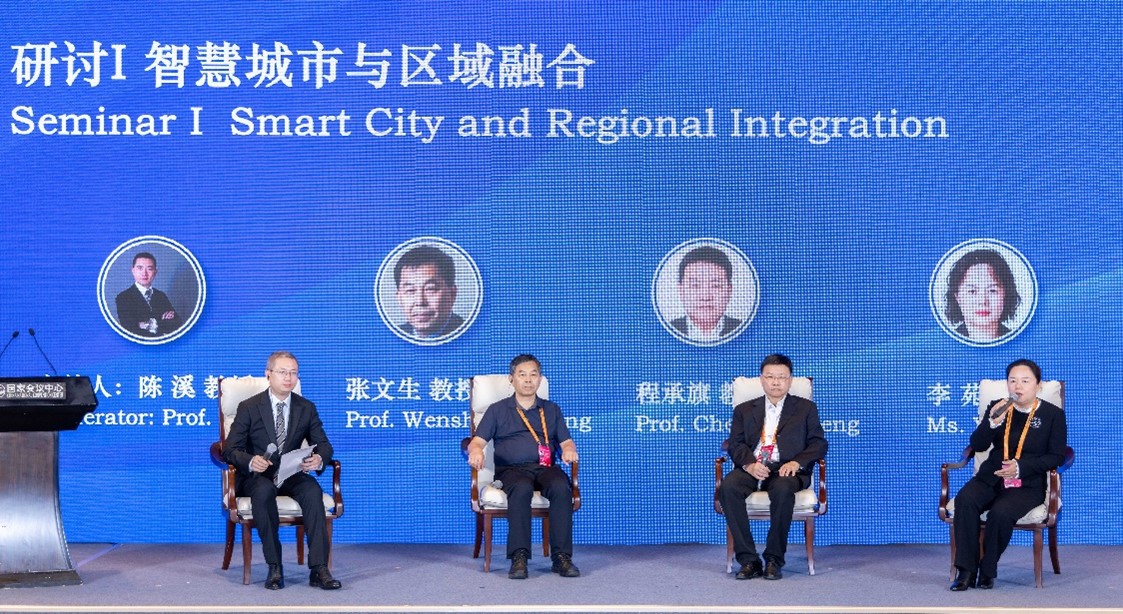
Prof. Xi Chen moderated the seminar themed on “Smart City and Regional Integration”. A reporter from ifeng.com first raised a question about the future development of smart cities. Prof. Chengqi Cheng, Director of Center of Aerospace Information Engineering Research at Peking University and Chief Scientist of major national scientific research plan (973 plan), pointed out that the application of low-altitude unmanned aerial vehicles (UAVs) will soon gain popularity. Prof. Wensheng Zhang, Vice Chief Engineer and Distinguished Professor at National Key Laboratory of Multimodal Artificial Intelligence Systems at Institute of Automation, Chinese Academy of Sciences (CAS), held that we should rely on smart city development to enhance the resilience of city clusters. Ms. Yuan Li, Director of Institute of Information Technology, Center for International Economic and Technological Cooperation, Ministry of Industry and Information Technology of China, noted that China is leveraging its developed infrastructure to advance scientific and technological innovation. Prof. Xi Chen said that regional integration is a possible path for addressing climate change, food crisis, social turmoil, technological advancements and even geopolitical and technological competitions, and building smart cities that integrate multiple infrastructures is an effective way. Mr. Mustapha Sheriff from the National Public Procurement Authority of Sierra Leone raised the question about the strategy to improve the ranking of cities in developing countries. Prof. Xi Chen recommended that Sierra Leone prioritize its regional integration with Côte d’Ivoire, Nigeria and other nations in West Africa, and identify its position in global supply chains including that in Asia. Ms. Yuan Li suggested advancing the coordination between digitalization and green development. Prof. Wensheng Zhang believes that different strategies are needed for the planning, construction and operation of big cities and small towns. In addition, H.E. Rim Ayadi Ep Mahmoudi, Minister at the Embassy of Tunisia in China, raised the question about how to tackle unemployment caused by technological advancements. Prof. Chengqi Cheng and Prof. Wensheng Zhang said that technological advancements will create more job opportunities, but Prof. Xi Chen held that it will still take some time for technological changes to bring about institutional reforms.
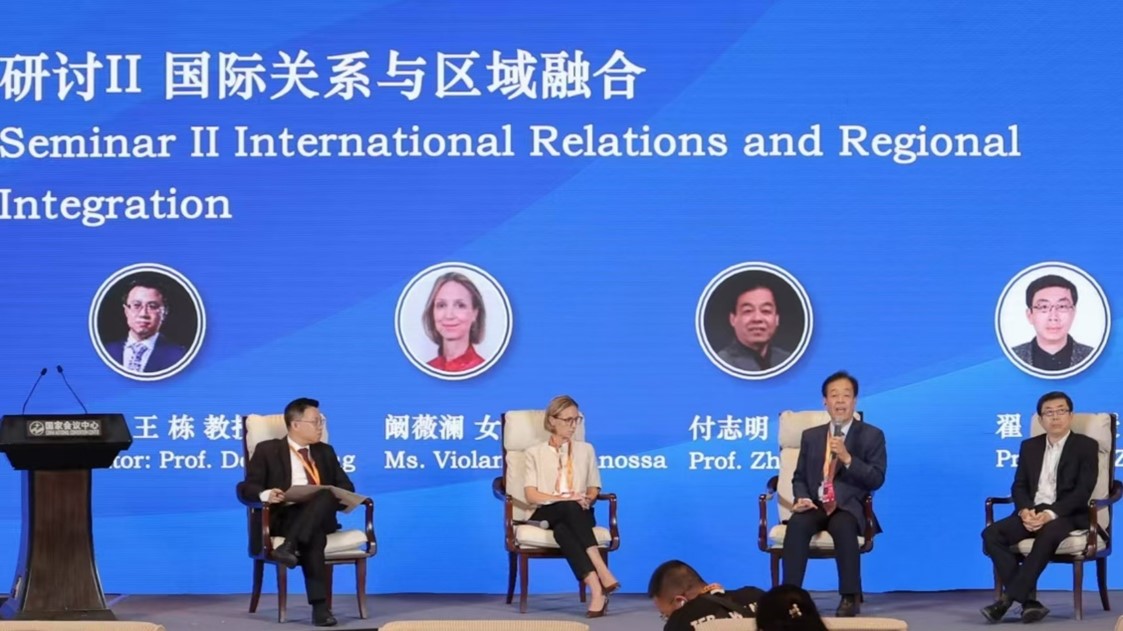
Prof. Dong Wang moderated the seminar themed on “International Relations and Regional Integration”. Mr. Amir Ali Boukhersa from the Ministry of the Interior and Local Administration and Land Consolidation of Algeria raised the question of how to explore ways to promote China-LAS or China-Africa cooperation. Ms. Violante di Canossa, Chief Economist at United Nations Development Programme (UNDP) China, responded that this can be done through the cooperation framework under the UN system. Prof. Dong Wang, as well as Zhiming Fu, Deputy Dean and Professor at School of Foreign Languages at Peking University and Kun Zhai, Professor at the School of International Studies and Deputy Director of the Institute of Area Studies at Peking University, pointed out that the potential value and future direction of this ranking report system lie in standardizing the indicator system and using it to guide regional development in practice, so as to further advance the re-globalization process. Furthermore, Prof. Kun Zhai proposed implementing this set of methodology in small and medium-sized countries to build corridor belts that take into account the interests of both China and the United States.
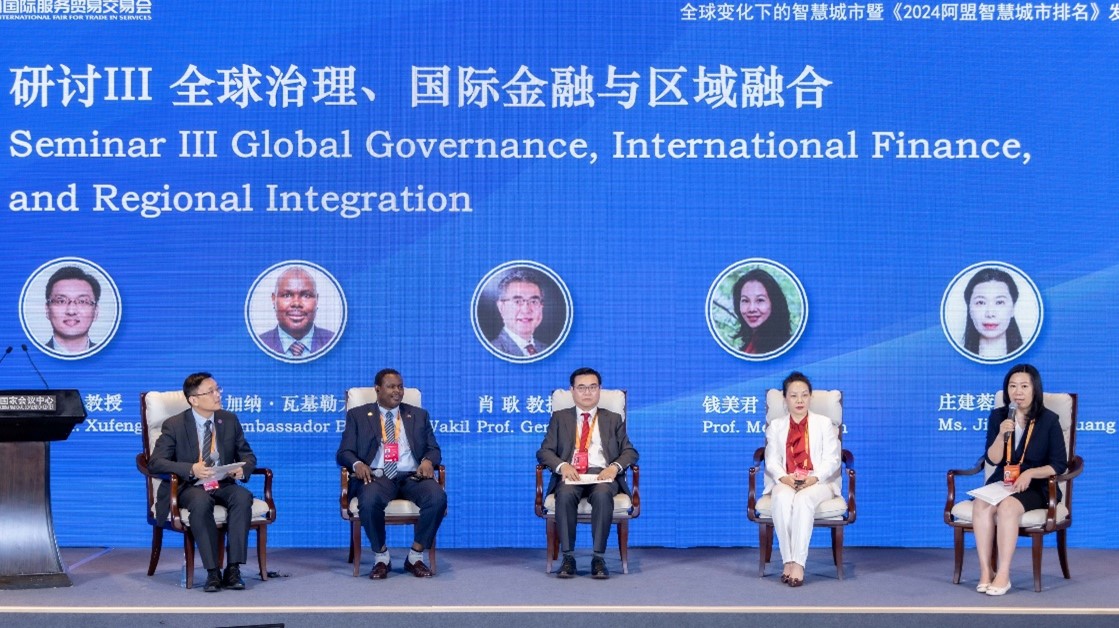
Prof. Xufeng Zhu, Dean of School of Public Policy & Management at Tsinghua University and Director of Center for Science & Technology Development and Governance, Tsinghua University, moderated the seminar themed on “Global Governance, International Finance and Regional Integration”. In the Q&A session, Mr. Ashraf Momtaz from the Ministry of International Cooperation of Egypt expressed worries about the massive investment or financing needs for smart city construction. Ms. Jianrong Zhuang, Director of Economic Affairs at the Beijing Municipal Commerce Bureau, held that large infrastructure projects should be led by the government, and efficiency-first projects should let market players be the main investors, for which investments may come from government funds or private funds both at home and abroad. H.E. Babagana Wakil, Charge d’Affaires a.i., Embassy of Nigeria in China, and Prof. Meijun Qian, Chief Fellow of Research Institute at People's Bank of China and Distinguished Visiting Professor of School of Public Policy & Management at Tsinghua University, held that we should still attach importance to the important role of the International Monetary Fund (IMF), the UN and other major international organizations in financial governance for global development and regional integration. However, Prof. Geng Xiao, Director of Institute of Policy and Practice, Shenzhen Finance Institute and Member of the Expert Group of the Chief Executive’s Policy Unit of the Hong Kong Special Administrative Region Government, argued that in the era of digital economy, it is necessary to fully leverage the power of market and regional integration to develop smart cities. Moreover, H.E. Babagana Wakil said that smart city development should be more inclusive, benefit more people, and lift more people from poverty. Prof. Xufeng Zhu held that the digital divide is not a negative impact of smart city development, but a result of insufficient smart city development.
Prof. Xi Chen made a technical summary for the event. He noted that technology is the starting point for regional integration and equitable development, and global governance is the guarantee to achieve this goal. Although there is a long way ahead to translating technical methodology into a global standard, the opportunities for collaboration remain promising, and we hope to work with international representatives to advance the initiative together. Next year, it is planned to launch the AU or ASEAN Smart City Ranking, and all parties are welcome to participate in in-depth cooperation to realize the common vision.
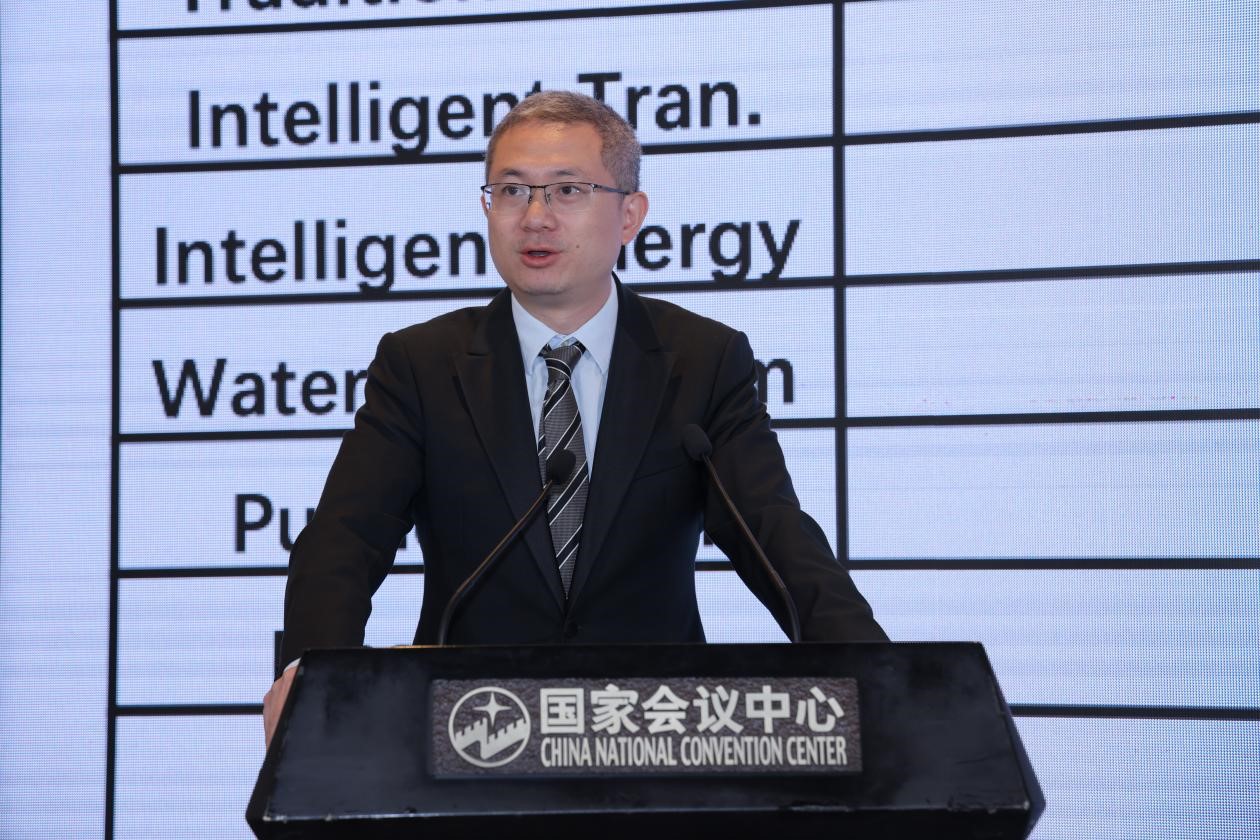
Prof. Xi Chen makes the technical summary.
At last, Prof. Geng Xiao delivered the closing remarks. Focusing on the forward-looking nature of smart cities, he emphasized the role of re-globalization and cities as fulcrums in this process. Cities are not only places for interactions between the people, governments and enterprises, but also the main stages for the digital era. In the face of complex geopolitical challenges, national security and cultural exchanges have become particularly crucial, and smart cities will serve as the foundation for promoting discussions on these issues. At the same time, he also expressed his confidence in the development of smart city projects and looked forward to more extensive research and collaboration to promote the development of smart cities in the future.
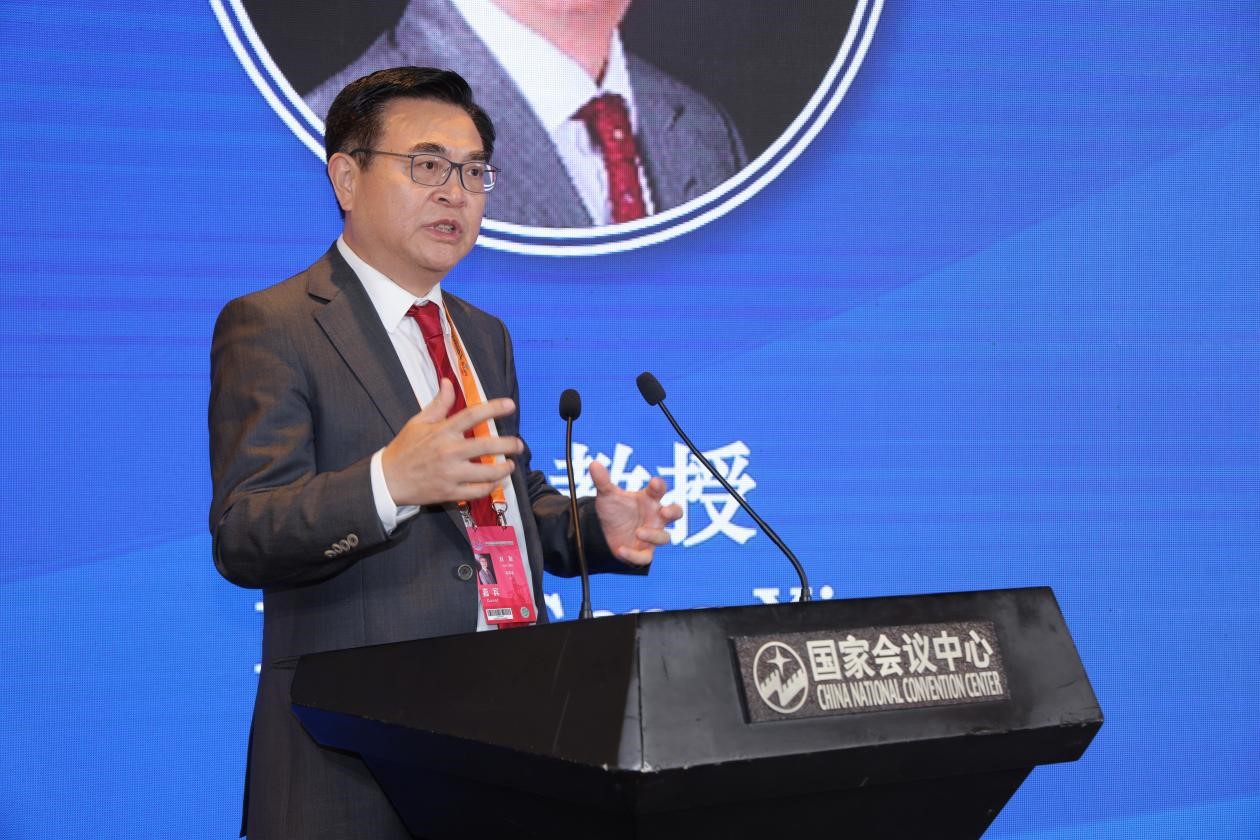
Prof. Geng Xiao delivers the closing remarks.
After the conclusion of the forum, at the invitation of the Moscow Municipal Government, Harbor Overseas, iGCU, Center for Science & Technology Development and Governance of Tsinghua University, Shenzhen Finance Institute, and Institute for Urban Internationalization Studies at Zhejiang International Studies University will jointly release the “2024 BRICS Smart City Index” at a special forum of the BRICS Summit on September 19. The 2024 LAS Smart City and the 2024 BRICS Smart City Index, coupled with the 2022 Asia Smart City Ranking and the 2023 The Group of Twenty (G20) Smart City Ranking released in Beijing, together constitute the series studies on the ranking of smart city construction and guide the development of smart cities and regional integration around the world. This has greatly enhanced the voice of Chinese scholars in the fields of smart cities and global governance in the international arena.